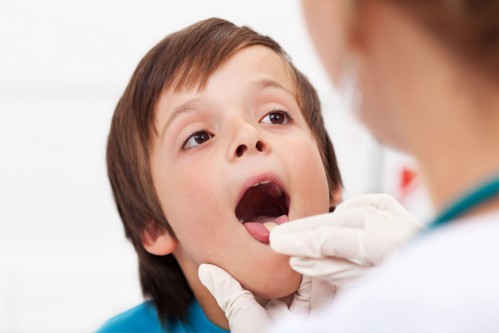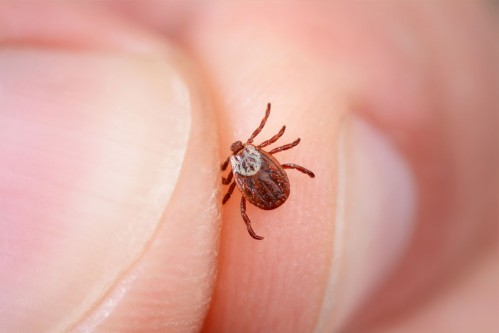
Diarrhea and Vomiting
Vomiting and diarrhea are common in childhood and are most often caused by a viral infection. Remember, viruses don't respond to antibiotics so your child does not need an antibiotic for most causes of vomiting and diarrhea.
What are the most common causes of vomiting with diarrhea?
- Viruses - the most common cause of vomiting with diarrhea is viruses. Other family members or schoolmates may have been or may become sick with the same symptoms. The most common type of viruses that cause vomiting and diarrhea are Norovirus and Rotavirus
- Food Poisoning - Your child may have rapid onset of vomiting and diarrhea just hours after eating a contaminated food. Often times, this is caused by germs growing in food which is left out too long. Others who ate the same food will also come down with the same symptoms.
How severe is my child's vomiting or diarrhea?
Vomiting
- Mild = 1-2 times per day
- Moderate = 3-7 times per day
- Severe = vomits everything, 8 or more times per day
- The severity of vomiting actually relates more to how long the vomiting goes on for. When you child first starts vomiting, it is very common for them to vomit everything for about 2-4 hours. Then, children often become more stable and vomiting decreases to mild severity.
Diarrhea
- Mild = 2-5 watery stools per day
- Moderate = 6-10 watery stools per day
- Severe = over 10 watery stools per day
- It is important to remember that diarrhea is defined as watery stools. Loose or runny stools are not true diarrhea and they alone do not cause dehydration.
How do I know if my breast fed child has diarrhea?
Diarrhea can be harder to detect in a breast fed infant as they normally have frequent, runny stools. However your breast fed infant might have diarrhea if:
- Stools suddenly increase in number and looseness. If this lasts for more than 3 stools, your child has diarrhea.
- Stools in breast fed infants are normally yellow, but can also be green, and runny stools can even look like they are boarded by a "water ring". These are all normal stools.
- Other clues that suggest that the baby has diarrhea are poor eating, fever or acting sick.
What do I need to worry about if my child has vomiting with diarrhea?
The main complication from vomiting and diarrhea is dehydration.
How do I know if my child is dehydrated?
The following are signs and symptoms of dehydration:
- No urine in more than 8 hours is an early sign of dehydration. Urine may be dark in color if your child is dehydrated. If your child's urine is light straw colored or clear, they are not dehydrated.
- Dry mouth and tongue. Dry lips alone are not a sign of dehydration.
- Dry eyes with decreased or absent tears
- In babies, the soft spot on the top of the head may be sunken
- If your child is lethargic and acting severely ill, they may be dehydrated. A child who is alert, happy and playful is not dehydrated.
- Dizziness when standing, or too weak to stand.
When do I need to take my child to be seen by a doctor?
If your child has any of the following symptoms, you should call 911 now:
- You can't wake your child up
- You child is not moving or is too weak to stand up
- You think that your child might be having a life-threatening emergency
If your child has any of the following symptoms, you should make an appointment for them to be seen in our office, ER, or Urgent Care now (if it is during office hours, we encouraged you to call our office before going to ER or Urgent Care as we can likely see your child in the office):
- The child is hard to wake up (is very lethargic)
- Your child seems confused or is acting "out of it"
- Blood in your child's vomit that is not from a nosebleed
- Green colored vomit (Normal stomach juice is yellow in color)
- Your child has pain low on the right side, won't jump up and down when asked and wants to lie very still. This may mean that your child has appendicitis.
- If you suspect that your child might have eaten or drunk something that would cause poisoning.
- You suspect that your child is dehydrated (see signs of dehydration above)
- Bloody stool
- Stomach pain when the child is not vomiting (However, stomach pain before vomiting is common)
- Your child is under 12 weeks of age and has vomited 2 or more times
- Severe vomiting (vomiting everything) for more than 8 hours while getting clear fluids only
- Fever over 104
- Your child looks or acts very sick
- Your child has been vomiting frequently for more than 24 hours
What can I do to keep my child hydrated while vomiting?
Formula Fed babies:
- Stop all solid foods. You will give your child oral rehydration solution (commonly referred to as Pedialyte) to keep them hydrated during while vomiting. This can be bought at any grocery or drug store. You do not need to give Pedialyte if the child only has diarrhea, you can continue with formula.
- Do not give any over-the-counter medications (except Emetrol, see below) for at least 8 hours, as some of these can make vomiting worse. Remember that mild fevers do not need to be treated with any drugs. For higher fevers which are greater than 102, you can use an acetaminophen suppository which is a form of Tylenol which is put in the rectum. Do not give your child ibuprofen as this can upset the stomach.
- If your child has vomited more than one time, offer oral rehydration solution for 8 hours. If you don't have any on hand, use formula until you can get some.
- Give your child 1-2 teaspoons (5-10 mL) every 5 minutes. You can use a spoon or syringe to feed your child these small amounts. Do not let them gulp large amounts of fluid, or they will vomit it.
- Double the amount to 2-4 ounces after 4 hours with no vomiting.
- After a full 8 hours with no vomiting, go back to giving regular formula. You may also slowly add in solid foods. Start with foods which are easy to digest such as cereals, crackers, bananas, rice, and bread.
Breastfed babies:
- You will reduce the amount per feeding to help your child keep the breast milk down. If your child is taking solids, stop all solid foods.
- Do not give any over-the-counter medications (except Emetrol, see below) for at least 8 hours, as some of these can make vomiting worse. Remember that mild fevers do not need to be treated with any drugs. For higher fevers which are greater than 102, you can use an acetaminophen suppository which is a form of Tylenol which is put in the rectum. Do not give your child ibuprofen as this can upset the stomach.
- If your child has vomited more than one time, nurse for 5 minutes every 30 to 60 minutes.
- Your child may want to nurse longer at the breast, however, if you let them nurse for a prolonged period of time, they are very likely to vomit all of the breast milk back up.
- After four hours without vomiting, return to regular nursing
- If the child continues to vomit despite decreasing the amount per feeding, switch them to an oral rehydration solution (known as Pedialyte). Give 1-2 teaspoons 5-10 mL every 5 minutes. Do this for 4 hours.
- After 4 hours with no vomiting, return to feeding at the breast. Start with small feedings 5 minutes in duration every 30 minutes. As your baby keeps down these small amounts, slowly lengthen the duration of feeding. After breastfeeding without vomiting for 8 hours, may start to slowly reintroduce solids. Start with foods which are easy to digest such as cereals, crackers, bananas, rice, and bread.
Older Children (over 1 year of age):
- If your child is having vomiting with watery diarrhea, they will need an oral rehydration solution (also known as Pedialyte). Some children do not like the taste and will refuse to drink this. You can use half-strength Gatorade (mix equal amounts of Gatorade and water).
- Your child should not drink only water, this can cause an imbalance of electrolytes in the body and make the child sicker. They need calories when they have vomiting and/or diarrhea.
- Stop all solid foods until 8 hours after vomiting has stopped.
- Do not give any over-the-counter medications (except Emetrol, see below) for at least 8 hours, as some of these can make vomiting worse. Remember that mild fevers do not need to be treated with any drugs. For higher fevers over 102, you can give Tylenol. Avoid ibuprofen as this can upset the stomach.
- You MUST limit the child to small amounts of fluid, if you allow the child to gulp large amounts they will most likely vomit it back up. Start with 2-3 teaspoons every 5 minutes.
- After 4 hours without vomiting, may slowly increase the amount.
- After 8 hours without vomiting, return to regular fluids.
- Avoid giving fruit juice or soda as these can make diarrhea worse. However, if that is all that your child will take, let them drink it. Getting fluid is the most important part of avoiding dehydration.
What should I do if my child has diarrhea, but no vomiting?
It can be easier to keep children hydrated if they don't have vomiting along with diarrhea. Most children with diarrhea can eat a normal diet, but you do want them to drink more fluids to stay hydrateformula-fed
- la fed infants, you should keep giving normal formula but you should feed more often. Offer as much formula as your child will take. Mix formula the normal way, do not attempt to dilute or add more water to the formula. You do not need to give oral rehydration solution (pedialyte) if the child is taking formula well. If for some reason the child is not taking formula well, you can attempt to give oral rehydration solution; give as much as the child will take and offer it frequently.
- In breast fed infants, offer the breast more frequently and allow the child to drink until they are satisfied. If you feel that the child is not getting enough breast milk, you can supplement with oral rehydration solution (pedialyte).
- Older children should be offered fluids frequently and allowed to drink as much as possible.
- All children who are eating solid foods should be allowed to continue solids. Offer easy to digest foods such as cereals, bread, crackers, rice and pasta.
- IMPORTANT: if your child is not eating solid food, you need to ensure that you are offering them a fluid which has calories is in (such as Gatorade, milk or half strength apple juice).
Are there any over the counter medications I can give my child.
There is an over-the-counter medication called Emetrol which can be used to decrease nausea and vomiting. This should not be used in children under the age of 2, or in any child with diabetes.
You may also want to start a daily probiotic as this has been shown in studies to decrease the severity of diarrhea as well as how long your child has diarrhea. These are also over the counter. Two brands that we recommend are Culturelle and Florajen. You'll start by giving this twice daily for two weeks and then may decrease to once daily.
What should I expect, how long can this last?
For the first 2-4 hours vomiting may be severe. Your child may vomit everything. However, vomiting usually decreases in frequency as the stomach settles
For most children, a viral stomach bug lasts no more than 12-24 hours. However, mild vomiting (1-2 times per day) with diarrhea may actually last longer. It can continue on and off for up to a week!
Occasionally, after having a viral stomach illness, your child will seem better for a day or two and then have another episode of vomiting. He or she will seem otherwise well. This is normal in children. If vomiting or diarrhea returns and is severe and your child vomits more than 1-2 times they should be seen in our office.
For children with viral diarrhea, it is not uncommon for diarrhea to last anywhere from 5-14 days. Diarrhea is usually severe for the first one to two days, and then slows down. However, loose stools can last for 1-2 weeks. If diarrhea has been present for longer than 7-10 days and is not improving or getting worse, you should contact our office during regular office hours.

Related Articles

Pediatric Medicine
Strep/Sore Throat
My child has a sore throat, how do I know if it is strep throat? It is important to remember that...

Pediatric Medicine
Fever FAQ
Most of the time, fever is not a medical emergency and can wait until the next morning to be seen in...

Pediatric Medicine
Rash after Fever
Fever followed by a rash is common in children. The most common cause is a viral illness called...

Pediatric Medicine
Tick Bites - What To Do
I see a tick on my child's body, how do I remove it? Use fine-tipped tweezers to grasp the tick...
